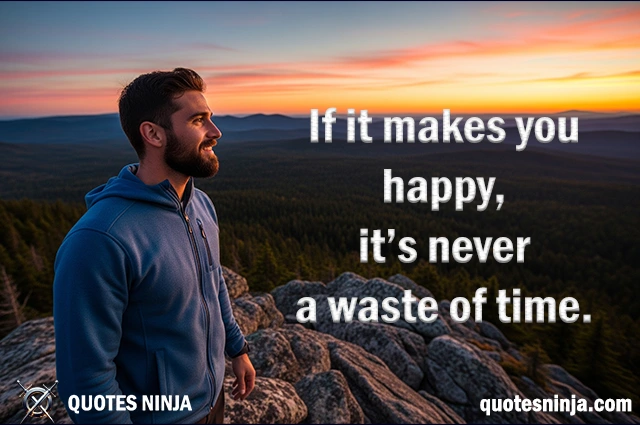
Deeper Meaning of Happiness Quote
The quote, “If it makes you happy, it’s never a waste of time.” expresses a simple yet powerful idea: Personal joy and fulfillment are inherently valuable, regardless of whether the activity is “productive” by conventional standards.
Here’s a deeper breakdown:
- “If it makes you happy…”
This part focuses on personal satisfaction, joy, or emotional well-being. It emphasizes the importance of what feels right or nourishing to you—not what others might define as important. - “…it’s never a waste of time.”
Society often defines “wasted time” as time not spent achieving goals, making money, or being visibly productive. But this quote challenges that notion. It argues that experiences that bring happiness—whether big or small—have inherent worth, even if they don’t result in tangible outcomes.
What It Means Practically:
- Watching a favorite movie for the tenth time? Not a waste.
- Spending hours painting, even if you’re not a pro? Still valuable.
- Laughing with friends instead of working late? Also meaningful.
Why It Resonates:
In a fast-paced world that often glorifies hustle and efficiency, this quote reminds us that emotional fulfillment is not just valid—it’s essential. Time spent on joy, rest, or creativity isn’t lost; it’s invested in your well-being.
A story inspired by Happiness Quote “If it makes you happy, it’s never a waste of time.”
Happiness Story: “The Girl with the Green Umbrella“
In the heart of Montmartre, tucked between a quiet florist and a faded bookshop, lived a girl named Celeste. She didn’t speak much, but her eyes saw everything—every wrinkle in a stranger’s frown, every unspoken word caught between lovers, every feather that fell from the sky and spun like a whisper to the ground.
Every morning, Celeste walked to Cafe Boheme, not for the coffee—though it was decent—but for the ritual of it. The same waiter, the same crooked table near the window, and the same view of the city waking up. It brought her comfort. To others, it might have seemed pointless, even dull. But to her, it was a moment of calm in a world that rushed too fast.

Montmartre Morning:
One rainy Wednesday, with her green umbrella in hand and a stack of old postcards in her coat pocket, she noticed something odd. A man—mid-thirties, neatly dressed, but utterly forlorn—stood near the metro entrance, staring at a paper crane hanging from a string of a nearby tree. People rushed past him. No one noticed. But Celeste stopped.
She didn’t approach him then. Instead, she tucked the image away like a photograph in her mind.

Celeste’s Cozy Room:
That evening, as raindrops tapped her windowpane, she began planning.
The next day, she returned to that same tree. This time, she hung a row of paper cranes—each carrying a handwritten message:
“Hope folds quietly in corners.”
“You’re not invisible.”
“If it makes you happy, it’s never a waste of time.”
And then, she waited.

The Tree of Paper Cranes:
At exactly 8:45 a.m., the man returned. His eyes scanned the tree. His expression, once flat, bloomed with curiosity. He took one crane, read the message, and smiled faintly. Celeste watched from a distance, her heart fluttering like wings.
Over the next few weeks, she observed him. He began to smile more. One day, he left a note tucked in the bark: “To the person behind the messages—thank you. You’ve made the mornings lighter.”
Céleste never replied. She didn’t need to. His joy was enough.
Meanwhile, friends questioned her.
“Why spend your mornings watching strangers?” asked Marianne, her roommate. “You’re not writing a book, are you?”
“No,” Celeste said, sipping her tea. “But it makes me happy.”
Marianne rolled her eyes. “You could be doing something useful.”
Celeste smiled. “What’s more useful than kindness?”

The Lost Photo Album:
One Sunday, she found an abandoned photo album on a park bench. Inside were Polaroids of an old woman—smiling by the sea, dancing in a kitchen, laughing with a dog. There was no name, no note, only dates written in the corner.
Rather than leave it there, Celeste took it home. That night, she crafted a plan.
Using the dates, she tracked the locations in the photographs. She asked questions at cafes, florists, and grocery shops.
People didn’t always remember the woman, but the album sparked something: stories, laughter, sometimes even tears.
Eventually, she found someone—an elderly man named Henri—who recognized her.
“She was my wife,” he said softly. “That album… I lost it months ago.”
Céleste handed it to him with quiet reverence.
He held it like a fragile treasure, eyes wet. “Thank you. I thought I’d lost this part of her forever.”
As she walked away, the rain began to fall again. But this time, it felt gentle, not cold.

The Coffee Shop Connection:
One evening, as summer crept in, the man with the paper cranes approached her at Cafe Boheme.
“I know it was you,” he said, eyes warm. “The cranes. The messages.”
She blinked, caught off guard.
“I saw you hanging them,” he added, smiling. “I just didn’t say anything. I didn’t want to break the magic.”
Celeste laughed—softly, like a secret—and nodded.
“You changed my life,” he said. “I used to wake up dreading the day. Now, I look forward to small things.”
She shrugged, suddenly shy. “They weren’t grand gestures.”
“No,” he replied, “but they mattered.”
They sat together, sipping coffee as the sky turned the colour of ripe peaches. For the first time in weeks, Celeste felt seen—not as the quiet girl in the corner, but as someone who chose joy on purpose.

Legacy of Kindness:
Years later, people would talk about a girl in Montmartre who left anonymous gifts, who fixed broken things, who believed happiness was a kind of purpose in itself. They’d debate whether it was eccentric or noble, naive or quietly revolutionary.
But Celeste would only smile and repeat her favorite phrase:
“If it makes you happy, it’s never a waste of time.”
Because in a world that often confused success with significance, she had chosen meaning—the kind only kindness can bring.
Here is the ending of happiness story from the quote “If it makes you happy, it’s never a waste of time.”
Moral of the Story:
True happiness doesn’t need to be grand, productive, or recognized by others to be meaningful.
Small acts of kindness, creativity, or joy—done simply because they make you happy—are never a waste of time. In fact, they often have the power to quietly transform lives, including your own.
To explore more on stories and dive into related ideas, be sure to check out the other posts where we cover all sort of stories related to quotes. Stay tuned for more…..
To explore more on quote topics, be sure to check out the other topics where we cover all categories of quotes. Stay tuned for more…..

